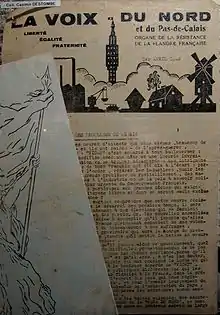La Voix du Nord (daily)
La Voix du Nord (French: [la vwa dy nɔʁ]; lit. The Voice of the North or The Voice of Nord) is a regional daily newspaper from the north of France. Its headquarters are in Lille.[1]
 | |
| Type | Regional daily newspaper |
|---|---|
| Format | Tabloid |
| Owner(s) | Rossel Group |
| Founded | 1941 |
| Language | French |
| Headquarters | Lille |
| Circulation | 231,066 (2014) |
| Website | Voix du Nord |
History
Voix du Nord was one of the underground newspapers of the French Resistance founded in German-occupied France during World War II. The paper first appeared in Lille in April 1941 at a time when the region of Nord-Pas-de-Calais was being ruled by a German military government in Brussels.[2] The newspaper's tag-line described itself as the "Resistance organ of French Flanders."[2]
The post-war version of the paper is part of the Belgian company, Rossel group,[3] which also owns the major Belgian newspaper Le Soir, which it bought from Socpresse in 2006.
Origins in Occupied France

La Voix du Nord is a clandestine newspaper that gave rise to a movement of political resistance. The resistance group was called Voix du Nord ("Voice of the North"—of France, or, "Voice of the Nord "—a French department). Sixty-five copies of the first issue of the newspaper were printed, dated April 1941. It clearly announced the newspaper's mission statement:
In France no newspaper, no radio, and no man can speak freely in the French language. The only French voices come to us through the radio from London; we are in agreement with them; and we believe: one does not compromise with duty and honor; one does not compromise with evil; one does not collaborate with the enemy.
The newspaper affirmed its support for General de Gaulle and its opposition to the Vichy government. At the outset, they were two very different men: Jules Noutour, police brigadier, trade unionist, and socialist member of the SFIO party; joined by Natalis Dumez, social Catholic. Dumez was the heart and soul of the editorial staff: she was primarily responsible for the four hundred articles that appeared in the first 39 issues. Noutour was arrested on 8 September 1943 and deported to Gross Rosen, where he died 1 February 1945.[5]
From the four Roneotyped pages of the first day, the newspaper rapidly grew to six, and then ten pages. Due to the difficulties in obtaining supplies of paper, the page count was later reduced to four pages in February 1943. Circulation was around 900 copies initially, growing to 15000 in January 1943. The paper came out every two weeks through September 1942, and monthly from 1943 on.
The last two issues were published in July and August 1944 under the responsibility of Jules Houcke, who published the first openly distributed issue of "La Voix du Nord" on September 5, 1944. The first page is crossed out, with a headline spanning six columns: "The Northern Region is free. Freedom and independence were purchased at a high price: prison, torture, death camps for more than 530 people, who wrote, printed, and distributed these newspapers."[lower-alpha 2]
Modern
After the war, the paper was reborn as a hybrid partnership and limited liability company "La Voix du Nord - Houcke and Company". They took over the premises of the Grand Écho du Nord, and as was the habit elsewhere in France, they kept the staff on as well, and it was they who produced the former newspaper of the Resistance. For the original journalists who were actually part of the Resistance and notably the two co-founders who had not yet returned from deportation abroad in February of 1945, it was a betrayal by pseudo-Resistance members.[6] The shares of the new company rose in 1945, the original owners and members were priced out, and it took thirty years of litigation before they achieved success. In the 1950s, the paper started printing various local editions, giving it a regional coverage.
Voix du Nord is published in tabloid. The paper sponsors the Grand Prix de Fourmies bicycle race.
Circulation
| Year | Circulation |
|---|---|
| 1998 | 323,000[1] |
| 2000 | 332,000[7] |
| 2001 | 320,000[8] |
| 2002 | 307,191[9] |
| 2003 | 315,000[10] |
| 2014 | 231,066[11] |
See also
References
- Notes
- Mission statement from first issue: "En France aucune presse, aucune radio, aucun homme ne peut parler librement un langage français. Les seules voix françaises nous viennent par la radio de Londres, avec elles, nous sommes d'accord et nous pensons : on ne transige pas avec le devoir et avec l'honneur ; on ne pactise pas avec le mal ; on ne collabore pas avec l'ennemi."
- From the September 1, 1944 issue: "La Région du Nord est libre . La liberté et l'indépendance furent payés au prix fort : la prison, la torture, les camps de la mort pour plus de 530 personnes, qui ont écrit, imprimé et diffusé ces journaux."
- Citations
- William Kidd; Sian Reynolds (1 May 2014). Contemporary French Cultural Studies. Routledge. p. 235. ISBN 978-1-4441-6556-2. Retrieved 22 November 2014.
- Julian Jackson (2001). France: The Dark Years, 1940–1944 (1st ed.). Oxford: Oxford University Press. p. 412. ISBN 0-19-820706-9.
- "Belgian French-language news publishers, authors societies and Google reach partnership agreement" (PDF). Copie Presse. Brussels. 13 December 2012. Retrieved 19 February 2015.
- Duhamel, Jean-Marie (2011). "Printemps 1941 - automne 1942 : le temps des fondateurs" [Spring 1941 - Fall 1942: the time of the founders]. La Voix du Nord.
- Rudolph, Luc (2015). Policemen vs. policemen. Paris: SPE.
- La Voix du Nord, impostures, arnaques et profits [Shams, Scams, and Profits] (labrique.net).
- "Top 100 dailies 2000". campaign. 16 November 2001. Retrieved 2 March 2015.
- Adam Smith (15 November 2002). "Europe's Top Papers". Campaign. Retrieved 7 February 2015.
- "Media Markets and Newspapers" (PDF). SFN Flash. 7 (1). 7 January 2004. Archived from the original (PDF) on 24 August 2017. Retrieved 17 February 2015.
- "World Press Trends" (PDF). World Association of Newspapers. Paris. 2004. Retrieved 15 February 2015.
- "La Voix du Nord". OJD. Archived from the original on 2 April 2015. Retrieved 21 March 2015.
Further reading
- Vandenbussche, Robert; Béthouart, Bruno (2018) [1st pub: IRHiS (2009)]. "Approches d'un mouvement clandestin – Histoire et anthropologie de la Voix du Nord" [Approaches to an Underground Movement – History and Anthropology of La Voix du Nord]. La clandestinité en belgique et en zone interdite (1940-1944) [Clandestine operations in Belgium and the Forbidden Zone]. Histoire et littérature du Septentrion (IRHiS). Lille: l'Institut de recherches historiques du Septentrion. pp. 159–225. ISBN 978-2490-29615-6. OCLC 1101082553. Archived from the original on 25 June 2020.
External links
- Official website
- Issues of underground La Voix du Nord online in Gallica, the digital library of the BnF.
